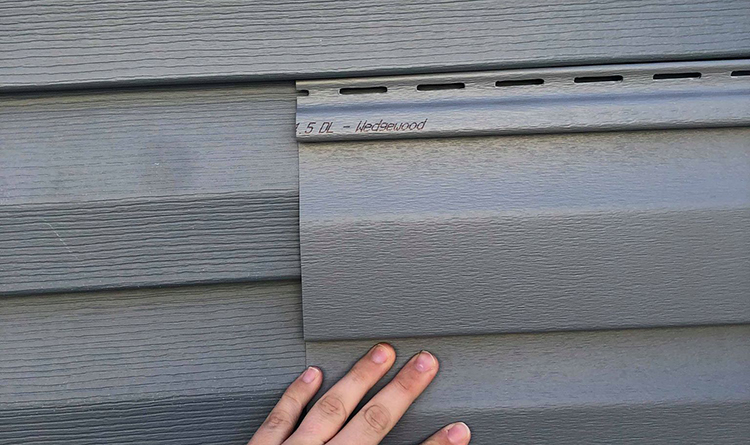
CAN YOU SEE THE DIFFERENCE?
By Dave Yochum. The worst thing that could happen to homeowners Joy and Eric Gillon happened back in December: A fire severely damaged the two-story house in tree-lined Madison Village just off Bethel Church Road. They lost all their possessions, but thankfully no one was hurt, including the family pets.
The house has been rebuilt, refinished and buffed, and the new gray siding is really good looking.
Except for one little thing. The shade of gray that was approved by the neighborhood’s Architecture Review Board (ARB) wasn’t available when the time came to install the vinyl siding.
The contractor installed the next best thing, a shade of gray hardly discernible from the first one.
“The siding is actually vinyl and what we had approved was a different brand. Our contractor installs another brand, which is a little different but is the closest that they had,” Eric explains.
A firestorm resulted, with the powers that be giving the Gillons, who’ve essentially just gone through the worst experience of a lifetime short of death, a shellacking.
“I never wanted it to go this way,” says Eric.
HOA issues are common across the country, with homeowners signing away some of their rights to move into a neighborhood with rules, regulations and certain standards that might, for example, prevent parking a truck on the front lawn, cutting up a truck tire for a swank planter around the mailbox or painting the house orange and brown for a year-round fall theme.
But this was one good-looking shade of gray vs. another good-looking shade of gray.
Things got so heated at least one officer of the HOA resigned in protest.
The ARB and the Madison Village HOA relented in late October.
Nevertheless attorneys say homeowners can’t be too careful when it comes to HOAs and architectural review boards. They generally have the upper hand as well as the resources to defend themselves.

ZAC MORETZ
There are a lot of possible land mines in the architectural approval process involved with building a new home or an extensive remodel.
“Both the homeowner and the ARB should make sure they have very clear and detailed written documentation of what has and has not been approved,” said commercial real estate and HOA attorney Zac Moretz, of Moretz Law Group, based in Concord.
The homeowner deviates from these specifics at their peril.
“If in doubt, go back and ask and get the answer in writing,” Moretz said.
HOAs must always act reasonably. Clearly, the parsing similar shades of gray wasn’t reasonable.
“Any requirements must have some sort of basis in the recorded restrictive covenants,” Moretz said.
A court will look at the recorded covenants as well as the other homes on the same street in making a decision on what the ARB can and cannot reasonably require.
Things you should know if you’re in a Homeowners Association:
1. HOAs must treat everyone evenly, fairly and reasonably.
2. Rules and architectural requirements must comply with the recorded restrictive covenants and the N.C. Planned Community Act. Read them carefully.
3. Gather evidence and present it respectfully at the next board meeting.
4. Don’t miss deadlines or forgo opportunities to be heard.
5. Don’t be belligerent. The HOA has the power to lien and even foreclosure on your home. Show respect and you’ll likely receive it in return.
6. Request a hearing before the board. If you’re ignored, you may have to take the matter to court, a costly undertaking.
7. The best advice: Make sure your board is populated with reasonable people. HOA elections have consequences.
8. Go to the meetings. Object when appropriate. Write letters. Get your concerns on the record.
—Zac Moretz contributed to this checklist




